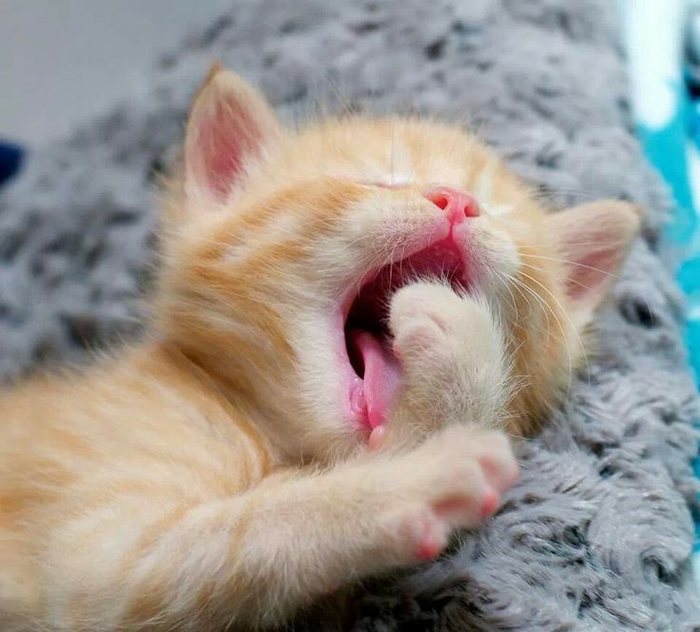(单词翻译:单击)
听力文本
This is Scientific American — 60-Second Science. I'm Christopher Intagliata.
Not many scientific studies begin like this: "Many hours of watching YouTube clips. Trying to find as many yawns as possible." But for Andrew Gallup, an evolutionary psychologist who studies yawning at the State University of New York, it was all in a day's work.
Gallup says yawns have traditionally been known as a sign of sleepiness, or boredom. "But recent evidence suggests that yawning may function to promote brain cooling." The idea being, when you breathe in deeply, the incoming air slightly cools the brain. And stretching the jaw increases blood flow to the brain too — another cooling factor. Reason we do it at night? "At night time when we're about to go to sleep our brain and body temperatures are at their highest point throughout the day, and that's when we see the highest frequency of yawning."

And so Gallup and his colleagues found themselves hunting for cat videos on the internet (cat yawning sound) — along with clips of dogs, foxes, elephants, gorillas, hedgehogs, squirrels, rats, and walruses yawning. They timed all those yawns — and then compared them to each species' average brain weight, and the number of neurons in the cerebral cortex.
Their conclusion, published in Biology Letters, was that the length of a yawn was a remarkably good predictor of an animal's brain weight, and cortical neuron number — regardless of the size of its skull, or jawbone. "What that really represents is that yawning likely serves this very basic, and fundamental neurophysiological function." In other words — it helps the brain keep its cool.
Thanks for listening for Scientific American — 60-Second Science Science. I'm Christopher Intagliata.
参考译文
这里是科学美国人——60秒科学。我是克里斯托弗·因塔利亚塔。
并没有很多科学研究像这样开始:“长时间观看优兔网视频。找到尽可能多的打哈欠视频。”但是,对于纽约州立大学研究哈欠的进化心理学家安德鲁·盖洛普来说,这是每天的工作。
盖洛普表示,哈欠通常被认为是困倦或无聊的征兆。“但是最近有证据表明,打哈欠可以帮助大脑冷却。”思路是,当你深呼吸时,吸入的空气会使大脑降温。而伸展下巴会增加血液流入大脑——这是导致大脑降温的另一个因素。为什么我们经常在晚上打哈欠呢?“因为晚上我们要入睡时,我们的大脑温度和体温达到一天当中的最高点。所以那个时间是我们打哈欠频率最高的时候。”
所以盖洛普和他的同事在网上寻找猫咪打哈欠的视频(猫咪打哈欠的声音),他们还找了狗、狐狸、大象、大猩猩、刺猬、松鼠、老鼠以及海象打哈欠的视频。他们统计这些动物打哈欠的时长,然后将其与各物种的大脑平均重量以及大脑皮层神经元的数量进行比较。
该研究结果发表在《生物学快报》期刊上,他们得出的结论是:哈欠的长度能非常准确地预测动物大脑的重量以及皮质神经元的数量,而且可以忽略掉动物骨骼以及头骨的大小。“研究结果真正表明的是,打哈欠具有基本的神经生理功能。换言之,它可以帮助大脑降温。”
谢谢大家收听科学美国人——60秒科学。我是克里斯托弗·因塔利亚塔。
译文为可可英语翻译,未经授权请勿转载!
重点讲解
重点讲解:
1. be known as 称为;叫做;
例句:This process is known as adaptation.
这个过程即所谓适应。
2. breathe in 吸入;吸气;
例句:She breathed in deeply.
她深深地吸了口气。
3. be about to do sth. 即将(做…)的;快要(发生…)的;
例句:I was just about to tell you when you interrupted.
我正要告诉你,你把话打断了。
4. regardless of 不顾;不管;不论;
例句:Nobody will believe him regardless of any excuse.
不管他找什么借口都没有人相信。
5. in other words 换言之;换句话说;也就是说;
例句:You can come here to work next Monday. In other words, you have been employed.
下周一你就可以来上班了。换句话说,你被录用了。


